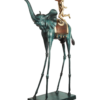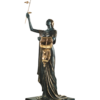DETAILS
Year:devised and first cast in 1980
Height:176 cm
Material:bronze
Technique:lost wax
Edition Size:6 plus 3 EA, 3 HC
DESCRIPTION
This sculpture recalls Dalí’s 1937 oil painting Burning Giraffe, and unites two of his favorite motifs: female figure with drawers and fire. The female figure here is composed largely of flames. These inextinguishable flames represent burning passion spreading from the feet upwards. Rising flames modelled in bronze give the impression that the whole figure is consumed by fire and seems to have a life of its own. The woman’s physical appearance acquires a new perspective: crutches support her arched body and she is compartmentalized by drawers. Influenced by Freud’s theories, drawers were used by Dalí to symbolize the unconscious. As Dalí once said “The human body is full of secret drawers that can only be opened by psychoanalysis”. Originally the figure was completely curved backwards. Mr Beniamino Levi recounts Dalí throwing the wax model to the floor in a moment of rage when he suggested straightening the bust slightly. Without Gala’s help in reasoning with Dalí, the sculpture would not exist as it does today in this expressive, intimate form.
This sculpture recalls Dalí’s 1937 oil painting Burning Giraffe, and unites two of his favorite motifs: female figure with drawers and fire. The female figure here is composed largely of flames. These inextinguishable flames represent burning passion spreading from the feet upwards. Rising flames modelled in bronze give the impression that the whole figure is consumed by fire and seems to have a life of its own. The woman’s physical appearance acquires a new perspective: crutches support her arched body and she is compartmentalized by drawers. Influenced by Freud’s theories, drawers were used by Dalí to symbolize the unconscious. As Dalí once said “The human body is full of secret drawers that can only be opened by psychoanalysis”. Originally the figure was completely curved backwards. Mr Beniamino Levi recounts Dalí throwing the wax model to the floor in a moment of rage when he suggested straightening the bust slightly. Without Gala’s help in reasoning with Dalí, the sculpture would not exist as it does today in this expressive, intimate form.



